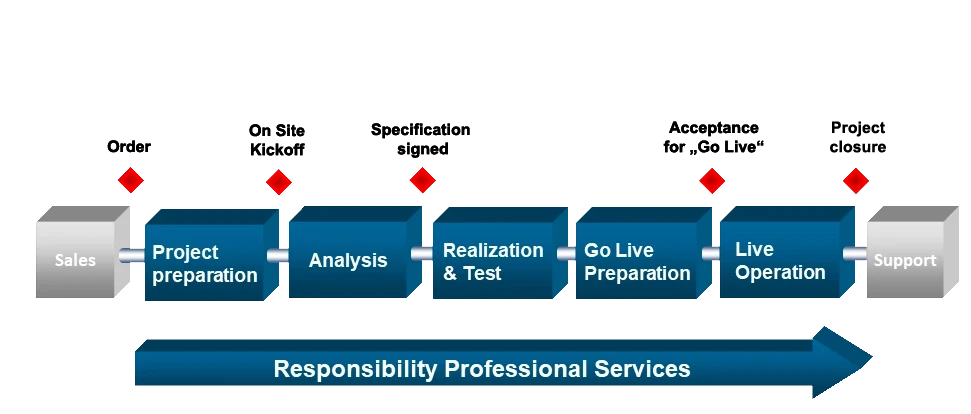Professional Services
In order to benefit as quickly as possible from the advantages of the iTAC.MOM.Suite, a smooth and fast implementation of the solution plays a decisive role. Our Professional Services Team, which consists of experienced specialists, will support you throughout the entire process and always make sure that you get the support you need.

Our Professional Services team is at your side - from project preparation to test operation and up to the final completion of the project. In addition to their knowledge of configuring the iTAC solution and its customizing, our experts also have the associated IT know-how and expertise in the areas of digitalization and automation.
Through clear project structures and the allocation of tasks, the project can be completed successfully and on schedule in all involved departments of the company. The close, interdisciplinary cooperation of all participants is particularly important, so that everyone can benefit from the MOM-solution.
The focus of our Professional Services team is always on the individual configuration of the solution, the alignment to the requirements defined in the specification in advance, the setup of the required interfaces and the successful commissioning.
Responsibility of Professional Services
Detailed project preparation is vital for successful project completion. The individual procedures are determined during the preparation phase together with the customer.
During this phase, the team is organized and the tasks, processes and necessary stations are defined and rules established together with the project manager. In addition, possible risks are identified, milestones are set and success criteria are defined.
The most important objective in this initial phase is to ensure a common understanding of the content and objective of the project.
Results:
- Project milestones are set
- Procedures are defined
- Tasks and packages are defined
During this phase, we work together with you to develop all requirements and obligations for the project and document these in a requirements specification.
All relevant framework conditions, such as the networking and dependencies between the individual work packages, are taken into account.
- What equipment is required?
- What changes and adjustments in a company’s IT system and plants are necessary?
- What processes and procedures may be affected by adjustments?
These and many other questions are answered during this phase. Our project managers have extensive experience in this area and provide support using “best practice” solutions.
An important part of this phase is the basic training on the iTAC.MES.Suite for all relevant project staff.
Upon completion of this phase, the final project plan is completed and both parties sign the requirements specification.
The requirements specification
- documents all relevant processes,
- defines the iTAC.MES.Suite configuration,
- defines possible modifications and
- defines the testing procedures / validation.
Installation of iTAC.MES.Suite is usually completed on-site together with the customer, but can also be carried out by remote control upon request. The iTAC.MES.Suite is configured according to the requirements specification. All relevant data is migrated and master data, such as work plans, BOMs, etc., is imported.
Apart from the execution itself, this phase is characterized by project progress control. Insight gained with regard to current or future deviations allows any necessary adjustments and extensions to be made.
Key Users designated by the customer are trained in so-called “train the trainer” seminars. If requested by the customer, these users can be actively integrated into further project phases. Testing of the total system, which includes integration tests (offline scenario), completes this important phase.
Results:
Completion of the basic configuration including any necessary adjustments.
Step-by-step during preparation for simulated operation, all system functions and interfaces are activated according to the project plan. A detailed plan for switching over to live operation is vital.
Before the customer can explicitly approve live operation, which is carried out by iTAC, the “Key Users” receive training on any new or modified processes and applications. We recommend that the end users be trained according to the “train the trainer” model.
Result:
The iTAC.MES.Suite, the system, processes and the customer are prepared for “live operation”.
After the first phases have been successfully completed, it is possible to switch to day-to-day operation. The system and its functions are now activated according to the project plan together with the customer. Following an initial run accompanied by iTAC, a final evaluation is performed.
The responsibilities and chain of command for support are defined in writing following the successful introduction of the iTAC.MES.Suite. This is an important supplement to the extensive installation documentation prior to and during the installation phase.
Relevant and future extensions as well as any potential improvements are also documented and passed on to the steering committee.
Results:
- The iTAC.MES.Suite is in operation
- The project is completed
- The customers’ operation concept is active
- Transfer to iTAC Support is completed
